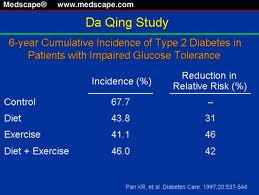Diabetes delayed by diet and exercise
Prevention is the buzzword in healthcare, but often medicine has to embark on the curative avenues. With the onset of a health problem patients are often tempted to throw in the towel: it’s too late now anyways. There is nothing I can do. It’s up to medication, pills or shots to get a handle on my problem. Nothing could be further from the truth, as major clinical trials have shown, when it comes to intervention to prevent the onset of diabetes. There is a stage where lab tests show that a patient has impaired glucose tolerance. He or she is”pre-diabetic”. Without intervention the development of diabetes is more or less imminent. But this does not mean that “it is too late “. It is exactly at that point, where lifestyle intervention can make a difference. How long do these post-intervention studies remain effective? Professor Guangwei Li at the China-Japan Friendship Hospital in Beijing, China and Dr. Ping Zhang from Centers for Disease Control and Prevention followed up patients 20 years after enrolment. In 1986, 577 adults from 33 clinics in China were randomly assigned to a control group or one of three lifestyle intervention groups (diet, exercise or diet and exercise combined).
All of the patients had impaired glucose tolerance. There was an active intervention program until 1992, and in 2006 participants were assessed for the long-term effect of the interventions. The results showed that the combined lifestyle interventions reduced the incidence of diabetes by about half during the active intervention period of 6 years. Over the 20 year duration the reduction was 43 %. At the end of the 20 year period 80% of the intervention group had developed diabetes, whereas 93% of the control group that had not followed a lifestyle intervention program were diabetic. The researchers reported that lifestyle intervention programs for patients with impaired glucose tolerance can indeed make a difference. A six year intervention program can delay the onset of diabetes by 14 years.
More information about diabetes: http://nethealthbook.com/hormones/diabetes/
Reference: Lancet 2008;371:1783-1789; 1731-1733.
Last edited November 3, 2014






